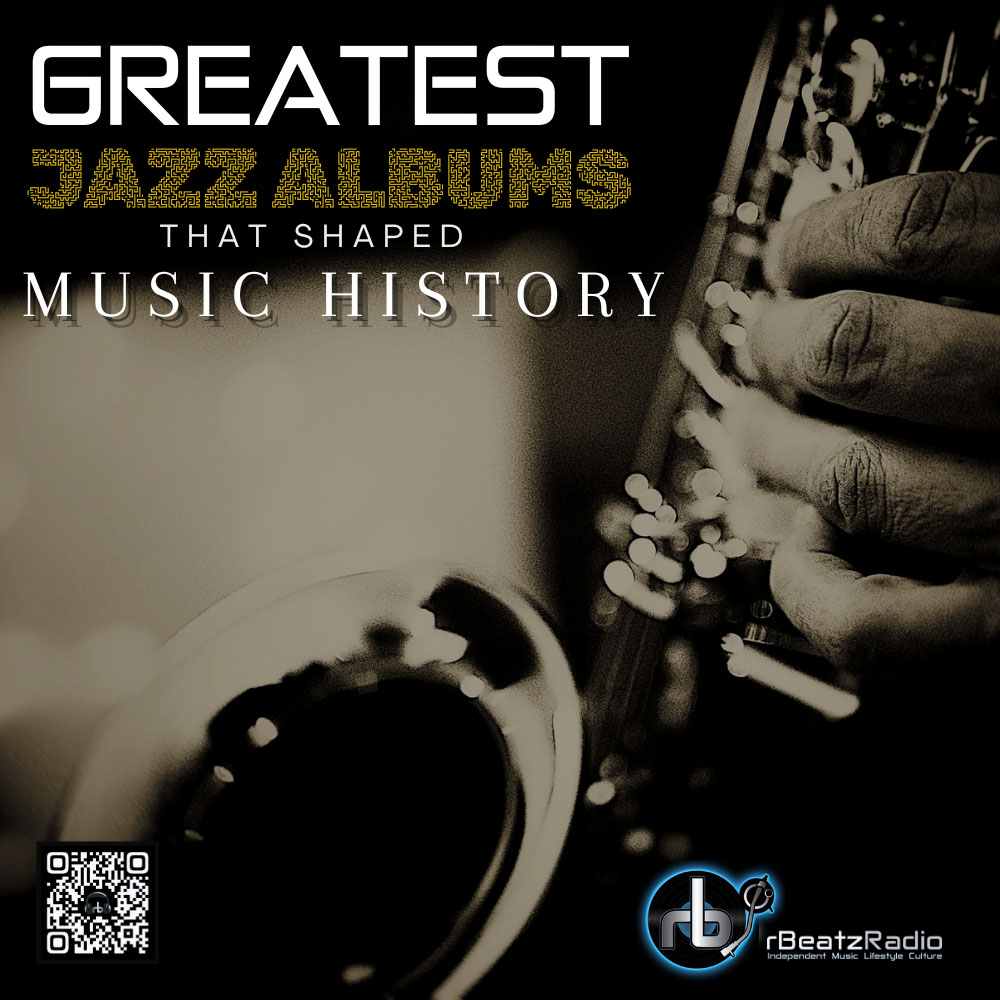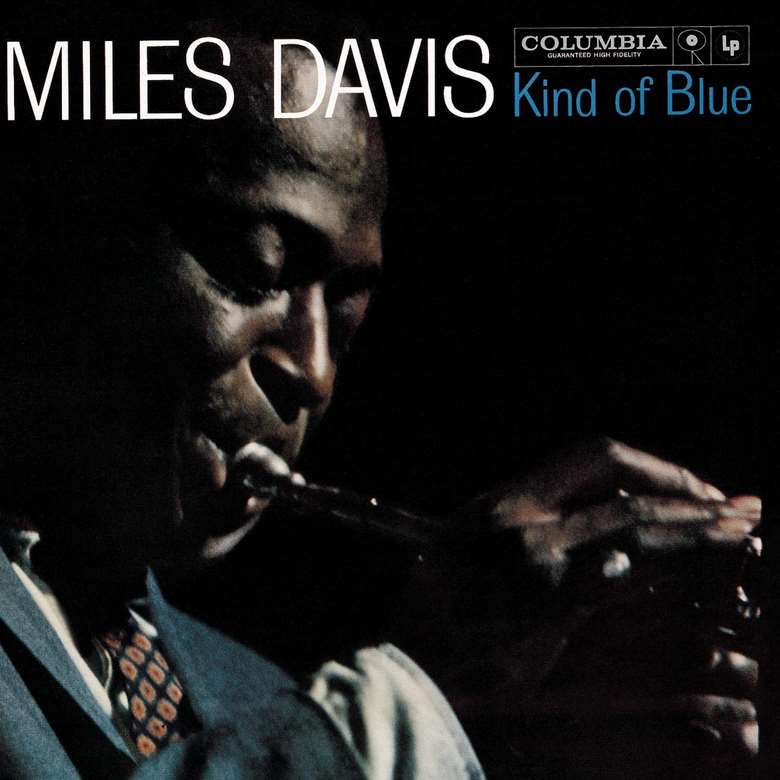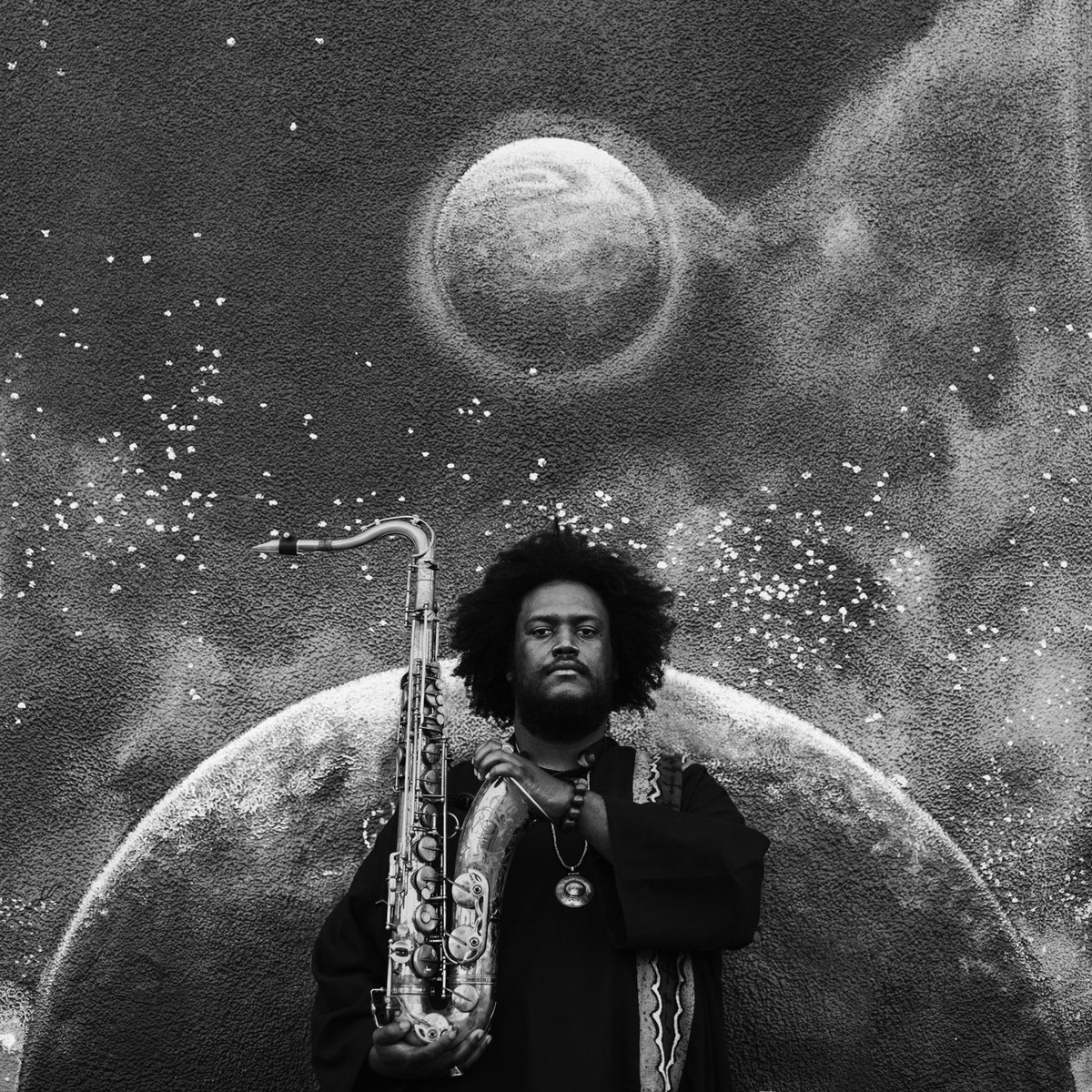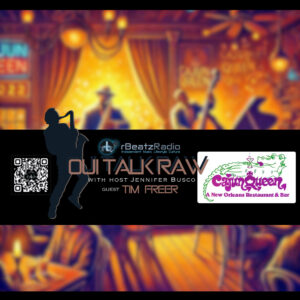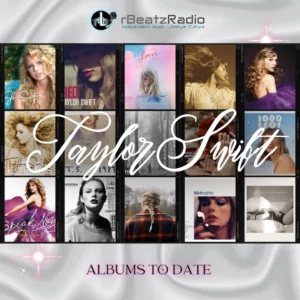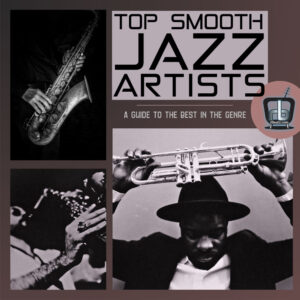Table of Contents
More than a genre, jazz is an unstoppable musical force with many names and faces. It’s a novel form of expression, a creative language for improvisation, and a new way to approach the musical foundations of harmony and rhythm. Jazz began more than 100 years ago in New Orleans, and so much amazing music has been released since then. From bebop to swing, from free jazz to avant-garde, jazz keeps on pushing forward with unique sounds, shapes, and stories for the world to enjoy.
While some music genres are defined by songs, for jazz, it’s always been about the journey. Let’s review the best jazz albums of all time to showcase the enduring presence and power of this unique music genre.
Greatest Jazz Albums That Changed the Genre
These outstanding jazz albums showcase the incredible longevity and diversity of this great music:
Miles Davis — Kind of Blue
Kind of Blue is probably the most popular jazz album of all time. Released in 1959, this seminal recording saw peak Miles Davis join forces with John Coltrane, Bill Evans, and other massive names. Kind of Blue had a huge influence on the world of jazz, and it also impacted classical music and the emerging rock scene. This album swapped vertical chord complexity for horizontal modal sketches, which led to famous jazz solos based on melodic innovations.
John Coltrane — A Love Supreme
Released in 1964, A Love Supreme is an iconic album by jazz saxophonist and composer John Coltrane. This famous long-player is presented as a tone poem, with Coltrane searching for creative purity with grace and gratitude. This is a spiritual jazz record delivered as a suite in four parts, and it conveys a profound sense of ecstasy and devotion. Along with outstanding music, this record features one of the most iconic jazz album covers of all time.
Ornette Coleman — The Shape of Jazz to Come
Ornette Coleman was responsible for some of the best jazz records of all time. Released during the genre’s heyday in 1959, The Shape of Jazz to Come is many people’s favorite. Coleman recorded this album as a quartet, and famously, it didn’t feature a traditional chordal instrument. Instead of a piano or guitar laying down harmonic structures, each track builds on distinct themes with creative repetition and free improvisation.
Sonny Rollins — Saxophone Colossus
Saxophone Colossus is the sixth studio album by jazz superstar Sonny Rollins. Recorded monophonically in 1956, it’s now recognized as one of the best jazz albums of all time. Saxophone Colossus is forged with dynamic energy and innovative technique, as the incredible Sonny Rollins digs deep with endless musical surprises. This was Rollins’ breakthrough record, and according to many critics, it’s his finest all-around set.
Charles Mingus — Mingus Ah Um
This is another record from 1959 — an absolutely incredible period for new jazz music. Mingus Ah Um is the debut studio album of Charles Mingus, delivered as a tribute to his favorite jazz musicians. “Open Letter to Duke” is a tribute to Duke Ellington, “Jelly Roll” is a reference to Jelly Roll Morton, but surprisingly, “Bird Calls” isn’t a homage to Charlie “Bird” Parker. Throughout this record, Mingus blends traditional jazz harmonies with boogie bass, bebop grooves, and gospel singing.
Ella Fitzgerald and Louis Armstrong — Ella and Louis
On Ella and Louis, two of the biggest figures in musical history join forces. While Ella Fitzgerald and Louis Armstrong weren’t household names in 1956 when this album was released, they certainly are today. This record is focused on the duo’s beautiful vocals as they deliver a tasteful rendition of ballads like “Moonlight in Vermont” and “A Foggy Day.” This was the first of three jazz albums Fitzgerald and Armstrong recorded together for Verve Records, followed by 1957’s Ella and Louis Again and 1959’s Porgy and Bess.
Ornette Coleman — Free Jazz: A Collective Improvisation
On rare occasions, single records are responsible for introducing an entirely new music genre. That’s certainly the case for this Ornette Coleman album, which introduced the wild and woolly sounds of free jazz to the world. This record was released in 1961, when this exciting new movement was just bubbling to the surface. Free Jazz: A Collective Improvisation was composed with a double quartet — two self-contained quartets combining a reed instrument, a trumpet, bass, and drums.
John Coltrane — Blue Train
Blue Train is another classic long-player released by John Coltrane. As one of the leading saxophonists and songwriters of his generation, Coltrane is responsible for creating some of the best jazz of all time. This album comes from 1958, with four of the five compositions written by Coltrane himself. The exception is “I’m Old Fashioned,” a jazz standard included on countless recordings over the years. This album features broken chords and diatonic harmonies used in unconventional ways, with a few old-time blues riffs thrown in for good measure.
Miles Davis — Bitches Brew
On Bitches Brew, we hear Miles Davis explore novel musical territory. The eclectic spirit of the famous jazz trumpeter can be heard throughout this recording, which rocked the jazz world upon release in 1969. This album combines traditional jazz harmonies with experimental rock structures in a brilliant wash of impressions. It’s also full of Latin and funk polyrhythms, which defined the jazz fusion genre that became popular in the 1970s. At a time when jazz was considered commercially dead by many, Bitches Brew breathed new life into the genre.
Ornette Coleman — Science Fiction
Another Ornette Coleman classic, Science Fiction is an inventive, alien-sounding record full of brilliant compositions and manic playing. On this album, the avant-garde jazz saxophonist works with Charlie Haden on double bass, Ed Blackwell on drums, and Dewey Redman on tenor saxophone. This jazz album was crucial to Coleman’s career, bridging the raw sounds of his earlier records with the electric energy of his later sonic experiments.
Stan Getz and Joao Gilberto — Getz/Gilberto
This album is largely responsible for the bossa nova craze that took over America in the ’60s. It features jazz harmonies played against Brazilian samba rhythms to create unique fusion jazz with physical power. This album features lots of memorable vocal hooks, which Stan Getz followed with perfectly formed saxophone solos. This jazz album features an English language version of “The Girl from Ipanema,” with Joao Gilberto’s wife Astrud singing the classic to great effect.
Duke Ellington — Far East Suite
Released in 1967, Far East Suite was one of the last jazz albums of The Duke’s long and influential career. On this album, Ellington added the colors and textures of the Orient to his already-full sonic palette from the swing era. This record delivers a rich, majestic sound that manages to feel both strong and fragile. The track “Isfahan” deserves special mention, with this fantastic piece now recognized as a modern jazz standard.
Eric Dolphy — Out to Lunch
When Out to Lunch was released by Eric Dolphy in 1964, it made the jazz world sit up and pay attention. This influential five-track album marks the high point of 1960s avant-garde jazz. Out to Lunch was instantly recognized as a flawed but creative masterpiece, and its reputation has only grown with time. It balances wide-leaping melodies with off-kilter rhythms, in a highly organized musical mayhem that gets better each time you drop the needle.
Alice Coltrane — Journey In Satchidananda
The incredible Alice Coltrane released lots of amazing music over her career, but there’s nothing quite like Journey In Satchidananda. Released in 1971 on Impulse! Records, it marks a turning point in the harpist’s jazz career and spiritual journey. Coltrane was a Hindu devotee and spiritual leader, with this record heavily influenced by her guru Swami Satchidananda Saraswati. Musically, Journey In Satchidananda blends American jazz with Middle Eastern rhythms, North African culture, and Indian classical melodies.
Peter Brotzmann — Machine Gun
This incredible jazz album by Peter Brotzmann was released in 1968, and it’s one of the best European free jazz records of all time. Peter Brotzmann lays it all on the line with this release, delivering an ear-shattering document of modern jazz with fearsome fire and power. Machine Gun features three saxophonists playing against each other, blasting overblown noise with chaos and control in a continuous crescendo to nowhere.
Modern Jazz Albums You Need to Hear
Jazz has been around since the 1920s, and it’s still going strong to this day. It endures as a powerful form of musical expression, which continues to splinter and splice in various forms. Beyond its African American roots, modern jazz is a massive creative and commercial force empowering diverse communities all over the world.
The following jazz albums represent the genre’s changing face since the turn of the millennium:
Acoustic Ladyland — Last Chance Disco
If you like your jazz mixed with punk and delivered with attitude, this 2005 album by Acoustic Ladyland will get your juices flowing. Last Chance Disco blends the musical freedom of jazz with the energy of punk and thrash metal. It’s dirty, electric, and full of musical explosions delivered with optimism and anger. While Last Chance Disco is not for everyone, it’s a great example of what jazz can be when you’re brave.
Keith Jarrett — Paris / London: Testament
On the other end of the musical spectrum, Paris / London: Testament is a solo piano album delivered with passion and grace. Keith Jarrett was one of the biggest jazz names still making tunes in the noughties, and this live album is one of his best. Paris / London: Testament is a live album recorded at two venues in 2008 — the Salle Pleyel in Paris and the Royal Festival Hall in London. This record has an emotional presence and sonic purity rarely seen in the busy modern world.
Gregory Porter — Water
The fabulous Gregory Porter has recorded some of the best jazz music of recent decades. His debut studio album from 2010, Water, remains one of the best jazz recordings of the new millennium. This release has elements of Sammy Davis Jr. and Kurt Elling, but Porter pushes things in his own direction. On this album of original smooth jazz cuts, Porter’s soulful voice is backed by blues-based rhythms and fantastic instrumentation. This album features a great rendition of “Skylark,” a 1941 jazz staple created by Hoagy Carmichael and Johnny Mercer.
Kamasi Washington — The Epic
The Epic is the third studio album by Kamasi Washington, released in 2015 following two self-released jazz albums. This record is both explorative and accessible, with the American saxophonist presenting a new version of spiritual jazz with avant-garde technique. The Epic has a deep, rich, and holistic vibe that would make Alice Coltrane proud, and it’s delivered with a real sense of purpose. Most of the music is written by Kamasi Washington himself, and there’s also a delightful version of “Clair de Lune” by Claude Debussy.
Brad Mehldau — Ode
Brad Mehldau has released lots of amazing music since the late ’80s, including the stunning record Ode from 2012. This is a deeply personal record for the American pianist, who presents 11 absorbing new pieces in a timeless jazz style. This album features Mehldau’s regular trio partners, bassist Larry Grenadier and drummer Jeff Ballard. While Ode stands out for its original ideas, Mehldau is also known for recreating jazz standards and modern pop/rock recordings. His fantastic version of Radiohead’s “Exit Music (For a Film)” is definitely worth a listen.
Final thoughts
Jazz is a highly creative genre of music defined by improvisation and expression. From the blues-based sound of the early 20th century to the smooth jazz artists of the ’80s and jazz rap artists of today, this creative genre keeps redefining its place in the modern world. Whether you’re a lifelong jazz purist or a curious new listener, the jazz albums listed above are perfect for your next adventurous playlist.

